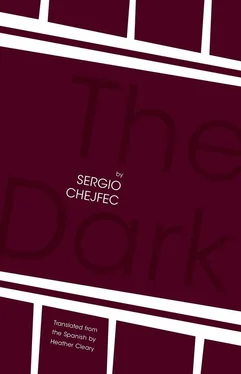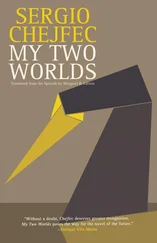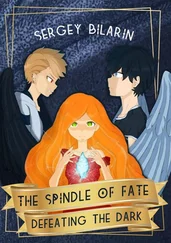Delia’s friend didn’t know what to do; from the window she could see the faint shadow of the car, the even line of the roof. Just like trains in stations, people leave traces on one another that almost immediately fade away. The thought appealed to her, since she wanted the man to be gone as quickly as possible. She suddenly remembered stories she’d heard; the people from her neighborhood, all of whom were poor, tended to believe in miraculous scenarios in which millionaires unexpectedly find a long-lost daughter living in anonymity and neglect. Her mind raced, it seemed impossible to focus on the urgent thoughts that filled it. The man finally spoke, though it was only to ask her name. Delia’s friend did not know how to answer something so simple. All questions are difficult, but familiar ones are especially problematic. They involve an act of memory, like when an adult calculates his age based on what year it is. In the end, as she said her name, she realized — though she had been aware of this all along — that she was moving farther and farther from home. She knew that her response, though true, broke a bond that had been strong until that moment. The man, for his part, didn’t believe what he’d heard; “It can’t be,” he said, as he turned the photo around so she could see it. Delia’s friend grimaced. Her solitude had been ambushed at the flank where we are all most vulnerable. She saw her own image in the photo, recognized each of her features from the memory, for example, of her fingers touching her face. She repeated to herself that it was impossible, and wondered what the outcome of this adventure might be. In her innocence she thought that if she had lied, none of this would have happened, that the coincidence lay not between the image and her face, but between herself and her name. It should be said that the matter was never resolved. She immediately discovered a new problem that only made the situation worse: there was another difference, which, although it affected the physical resemblance, also emphasized it. The tone of their skin was not the same. Though this was obvious, the stranger did not notice. For Delia’s friend, seeing herself with different skin meant being transported: not to a future or a past, but to a simultaneous, contiguous time.
Later, repeating the story in Delia’s presence, the friend added that the photograph the man had been carrying was actually of a painting, an oval-shaped portrait with a dark background and a fake gold frame. What she had first imagined to be the photograph of a person, as true as a legal document, became a drawing that dissolved into an unimaginable series of mediations. A turn of the screw, she said in different words, that complicated things further still. Because if the evidentiary proof, as they say, was a painting, the model was less important than the hand that had given her form. It seemed that the artist, whether he was right or wrong, had created a patient prophecy: the encounter with the model would eventually take place; the time and distance that needed to be crossed before this occurred were secondary. And so the episode was fixed in Delia’s friend’s past against a backdrop of confusion. It could not be said that she had forgotten it, but the mystery, which still left her anxious and often on the verge of tears, was such that she did not want to remember.
After I abandoned her, the first news I got of Delia was that she’d had the child. For a while, as I may explain later, there had only been chance encounters. I might run into her anywhere, wherever she had gone looking for me. For me, who wanted to forget, coming face to face with her was always a surprise. Having waited for hours, Delia would sometimes get distracted and not see me coming; on those occasions, I could sneak away in time, before she realized. But sometimes she saw me before I’d noticed her and I had to make my escape without shame or compassion. I needed time to pass quickly and to break the spell of having her in my sight, so I did the first thing I could — cross the street, look away — I don’t know, I tried to hide, though hiding was the most treacherous reaction possible. I knew there was nowhere to conceal myself: open to the point of exaggeration, vast and transparent, those flat expanses revealed even the indiscernible. But I tried, anyway. I don’t know how Delia reacted; I mean, I’m not sure what effect my behavior had on her. She’d watch me take off, and probably couldn’t understand it. I suppose the fact that the landscape kept me from hiding was yet another sentence passed down on her, because I was always in view. These encounters were brief, but they must have felt intolerably long to Delia. Things were no better for me; it was a pathetic sort of ending, and I knew deep down that none of these tricks would ever be enough. For example, I could jump behind some bushes or run away; Delia wouldn’t follow me, but these were only ways of mitigating an irreparable situation, that is, the fact that she’d seen me, when what I really needed was to blend in, go unnoticed, disappear — all of which were inconceivable in those parts.
Another thing that house had was flies, which were more of a presence there than in most other places I’ve been. Delia’s friend lifted a large pot to show it to me, and as I made out the dents on the bottom of it, the marks left by children tirelessly banging spoons against it, a fly emerged, startled, from the shadows. A common occurrence in people’s lives, this took on a particular meaning there. It may seem a bit naïve, but I saw it as another indication of the boundless hospitality of the poor. I’m not ashamed to put it like that, leaving a number of other things out. They were fat, black flies that had been part of the household for a long time. Every so often one would waver and seem to be on the verge of falling mid-flight as though, suddenly and without any external or internal force having alerted it to the fact, the animal had just become aware of its own mass, and was shocked by it. As a result, it would fly quickly upwards. Delia’s friend leaned over in the dark, looking for some other object to show me — a little later, she would find a tin with combs in it between two mattresses — when I suddenly wondered whether we might not all be flies as well. We submit ourselves to life just as they do, floating over the earth until we are startled by our own weight. It would have been hard to convey this to the lady of the house, I could imagine the uncomfortable silence she would offer in response, so it hardly seemed worth it, though it’s not as though there were much to explain. While Delia was changing, I kept getting the impression that her friend was about to say something. Showing me things was her way of communicating; this became especially clear when it would take her a moment to find something new and she’d open her mouth as though she were about to speak, only to immediately change her mind.
Later, as we left the house, I got the impression that I was stepping into a world that was different somehow, enclosed. It should have been the other way around: one goes into a house to escape one’s surroundings, but as I passed through the doorway I thought that the outside was actually the real inside, the true interior. Delia was beside me, quiet, exposed to the elements. The inside of the house felt like the outside, and the outside like the house, or rather, it felt like the house was an infinite expanse and its surroundings were only a part of the whole. We paused on the other side of the door where the ground dipped a bit, worn down from having been trod on so often. On either side, two flowerbeds sprouting different types of weeds indicated that someone, at some point, had wanted to plant a garden there, though they had almost certainly forgotten about it since. The immensity of the territory stretched out before us, an apparently limitless expanse flecked with clusters of shrubs, scattered houses, and gentle slopes. It wasn’t just the size of the surface that gave this sensation: one saw it this way because of its homogeneity, the vertigo of simple things. This simplicity ennobled the landscape, but it also silenced it, deprived it of a voice. It was the house that spoke for it, the house that endowed it with meaning, an existence. The house behind us, the broad territory ahead. Something small that justified something large; it occurred to me that expansiveness is incidental when there is a center to it, and that center was behind us just then. The light was fading; soon it would be night.
Читать дальше












